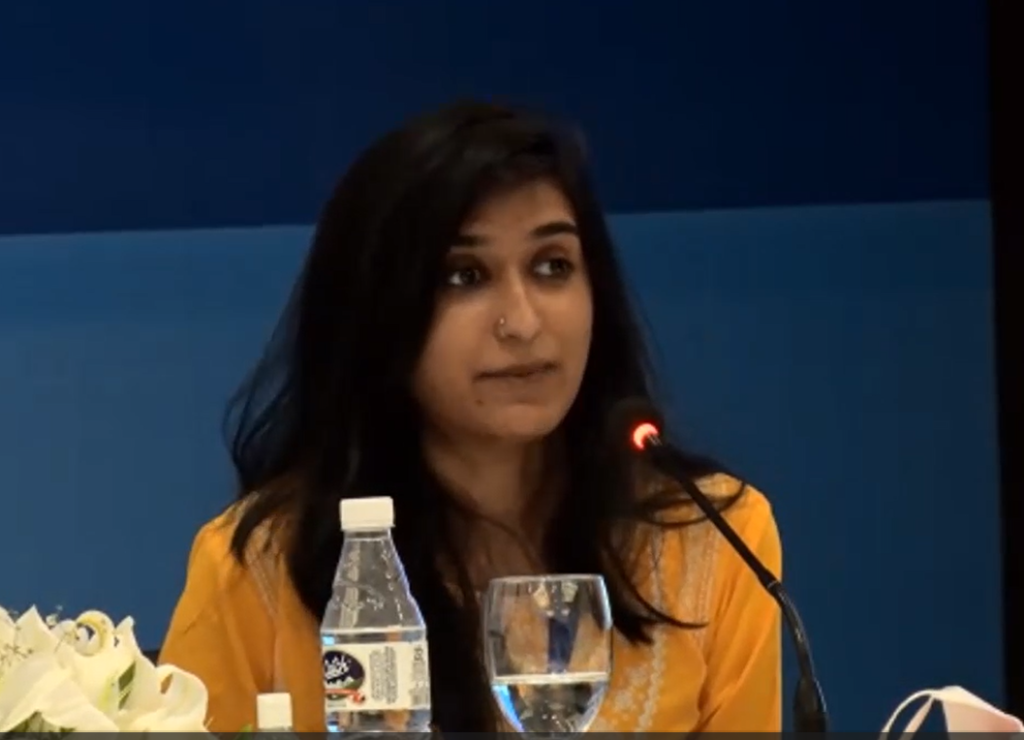
Ashna Ashesh: A Legal Eagle in the Public Health Sky, advocating for diverse, inclusive and equitable TB care
A personal odyssey led this lawyer to a key role in amplifying patient’s voices in healthcare and advocating for greater support networks for patients
Ashna Ashesh’s journey in public health was unexpected, an offramp from her initial career path in law, fueled by curiosity, personal circumstances and sparking a deep-seated passion for patient advocacy.
“My interest in public health was sparked when I worked on an article for my law review, specifically, a piece on the pharmacovigilance framework in India. This was when stories of non-consensual clinical trials on children were making headlines at the time of the Swasth Adhikar Manch PIL. My in-depth research on the Indian pharmacovigilance framework and its gaps sparked my interest in public health,” says Ashesh.
First steps towards an advocacy role
Transitioning into public health was not straightforward, given that direct career opportunities for lawyers in public health were limited. Ashesh found a stepping stone in the form of a fellowship with Azim Premji University’s School of Policy and Governance. This was her entry into public policy research.
Ashesh finally ended up working in public health by a twist of fate. During her fellowship, she was diagnosed with a deadly form of TB, Multi-Drug-Resistant Tuberculosis (MDR-TB). She had to grapple with the physical toll of the disease and the psychological impact of TB and related self-stigmatization.
Despite her knowledge of TB and understanding that her extra-pulmonary TB was non-infectious, Ashesh experienced internal stigma in her treatment journey. She emphasised that awareness and knowledge are crucial in mitigating stigma at all levels, from personal to community and public health.
“My experience with stigma was largely internal. I remember my Multi-drug-resistant TB (MDR-TB) diagnosis and the subsequent journey back to Patna for treatment. In the beginning stages of my DR TB treatment, I was overly careful and perpetually conscious.
Help from peers: patient support collectives
Amid the struggle, she found solace and support in Survivors Against TB, a community collective that works with TB survivors and experts to advocate for better TB care. Her association with SATB eventually led her to public health consultancy.

Ashesh began her work in public health as a Policy Associate in a development consultancy that worked on TB. Here she worked on research, writing, outreach, stakeholder engagement, training survivors, and providing input on government policies and frameworks.
Her role has since evolved to that of an independent public health consultant.
Centering patient voices
Her experiences with TB shaped her perspective on the importance of patient autonomy in healthcare. Advocating for survivor inclusion in decision-making processes, Ashesh believes in the critical role of affected community engagement in ensuring effective treatment and containment of infectious diseases.
Her advocacy extends beyond just policy and committees, with Ashesh challenging existing norms and calling for the inclusion of survivor voices in TB care. She has highlighted the need for integrated TB and Mental Health care, gender-responsive TB care, TB screening inclusive of extrapulmonary TB (EPTB) and for affected community engagement in TB elimination.
Ashesh’s approach to patient advocacy extends to on-the-ground action as well. In response to the initial COVID-19 lockdown, she was part of the team at SATB that set up a virtual help desk for individuals affected by TB. The collected experiences captured by the SATB help desk were converted into an observational study with useful insights for those wishing to future-proof the TB program against pandemics.
Ashna’s legal training is the bedrock for her public health work. Today, she integrates it into her work, focusing on a rights-based approach to health, aiming for diverse, equitable, and inclusive healthcare.
Her story underlines the importance of lived experiences in surviving and eliminating diseases like TB. In her view, advocacy is about harnessing the power of these experiences at all levels—policy, practice, and community. With her ongoing work and passion, Ashesh continues to bring survivor voices to the forefront.
Patients as healthcare powerhouses
Ashesh asserts that survivors are much more than their clinical history, pointing out that they bring a vast range of lived experience, professional skills, and perspectives essential for disease eradication efforts. The inclusion of survivors at various organisational levels adds value from their direct experience; it also draws on their diverse professional abilities, making for a beneficial collaboration in all respects.
“The survivors and public health advocates are experts in their own right. On a practical level, TB is an infectious disease, containment requires more than just compliance. Care needs to be based on partnership between the care provider and patient, not the fear of noncompliance. We need to collaborate with the survivors, as this collaboration is the key to improving the quality of care affected communities receive, and to eliminating TB.
From a user perspective, including the people for whom the service is intended is crucial. Drawing a cautious parallel with product design – if you design a product for women without consulting any women, it will likely fail in the market. The stakes are even higher in healthcare – it’s not about money but lives. It’s therefore imperative that survivors are present at the table and have the power to make decisions that affect them and their lives, explains Ashesh.
In the mind: mental health matters
Ashesh also emphasises the pressing need to recognise the correlation between TB and mental health. TB diagnosis and treatment often come with severe psychological stress, with responses ranging from anxiety, depression to suicidal tendencies, even.
Overlooking the mental health aspects of TB treatment is a disservice to patients and detrimental to TB eradication efforts. The impact of TB on mental health, combined with societal stigma and potential career disruption, necessitates integrating mental health care into TB treatment at the primary health care level.
Emphasising the need to regard mental health as a crucial part of TB treatment, Ashesh advocates for routine mental health screenings alongside physical health assessments throughout treatment. She insists on the availability of counselling and appropriate referrals when required, underscoring the importance of post-treatment follow-ups, including mental health evaluations. She says this is vital to avoid potential mental health crises and prevent any disruption in the TB treatment regimen. To truly deliver patient-centred care, Ashesh believes mental health care should be as important as any other aspect of treatment.
Diverse patient needs matter
In her critique of the current healthcare system, Ashesh draws attention to the underrepresentation and misconceptions about the LGBTQIA+ community in TB care. She insists on the crucial importance of inclusivity, highlighting that the care provided must cater to the unique vulnerabilities and challenges faced by diverse gender identities and sexual orientations. In short, an effective care system must incorporate the lived experiences of those for whom it is designed.
Ashesh called for a bottom-up approach to policy design and implementation, in which survivors and communities are seen as co-creators rather than mere recipients of care.
Not a champion, but still a hero
In discussing her own experiences, Ashesh rejects the popular narrative that TB survivors are ‘champions’, arguing that this portrayal is misguided and dismissive of the luck and privilege often involved in surviving serious illnesses like TB. She emphasises the need for a nuanced narrative that doesn’t glorify survivors but focuses on the objective of eliminating the disease.
Driven by her personal ordeal with TB and her skills in public health advocacy and law, Ashesh strives to “leave the TB care pathway a little better than she found it”.. While acknowledging her privilege during her treatment journey, she resists using her story as a source of ‘inspiration porn’. Instead, she utilises her experiences and privilege to advocate for meaningful change in TB care.
In the whirlwind of health struggles in India, where tuberculosis strikes hard, Ashna Ashesh stands tall. Her journey, filled with roadblocks in a healthcare system that sometimes forgets its women, resonates with power and resolve. Her inspiring and hopeful journey demonstrates the unwavering spirit of Indian women. Ashna’s story is a quiet voice in the storm, a symbol of resilience and a life wonderfully reclaimed—a true testament to surviving the odds.




